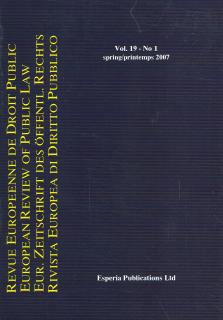
EUROPEAN CITIZENSHIP AS FEDERAL CITIZENSHIP
SOME CITIZENSHIP LESSONS OF COMPARATIVE FEDERALISM
CHRISTOPH SCHÖNBERGER
Professor of Public Law and European Union Law at the University of Kons¬tanz, Germany
The report deals with the problem of conceptualizing European citizenship. The general categories of citizenship law prevent an adequate conceptualization of this new status because they implicitly refer to centralized States. This unitary state-centered perspectice cannot even account for multi-layered citizenship arrangements in a State like Switzerland. To free ourselves from unitary concepts, we have to consider the possibility of tiered, nested citizenship in federal systems. To prepare such a general theory of federal citizenship, the experience of comparative federalism is particularly useful. Thus, the report analyzes the beginnings of federal citizenship in the early stages of the United States, Switzerland and Germany. It shows that all these Federations begun with a system where the incipient federal citizenship was predicated on the existing state citizenships. Federal citizenship started as interstate citizenship establishing free movement and equal treatment rights for state citizens in the new sister states. But those rights were limited, especially with respect to indigents, and we can find similar limitations in Community law today. This horizontal dimension of federal citizenship was central, while its vertical dimension, the immediate relationship between the citizens and the federal government, remained weak. The symbolic dimension of those early federal citizenships was as feeble as it is today in the European Union. The striking similarities between the citizenship of the early Federations and EU citizenship should no longer be overlooked.





















